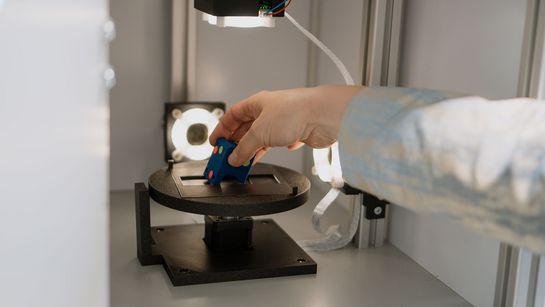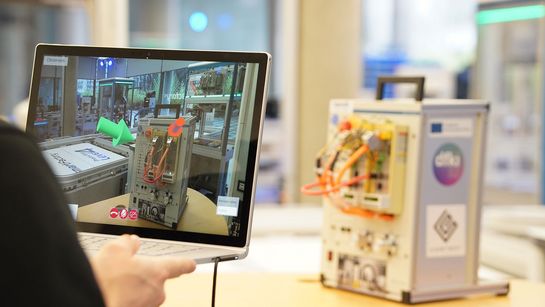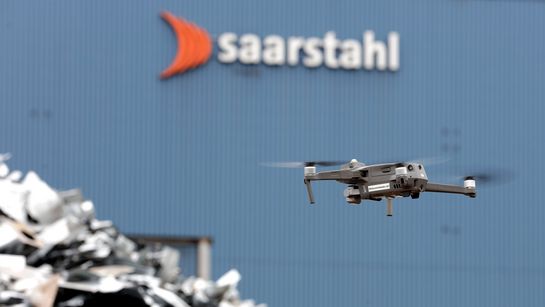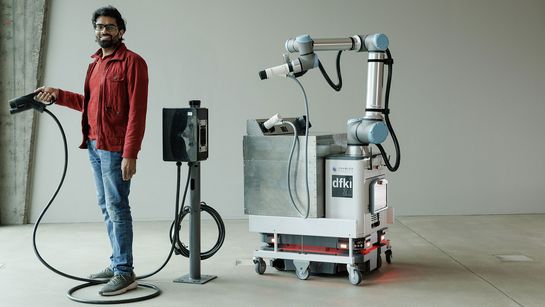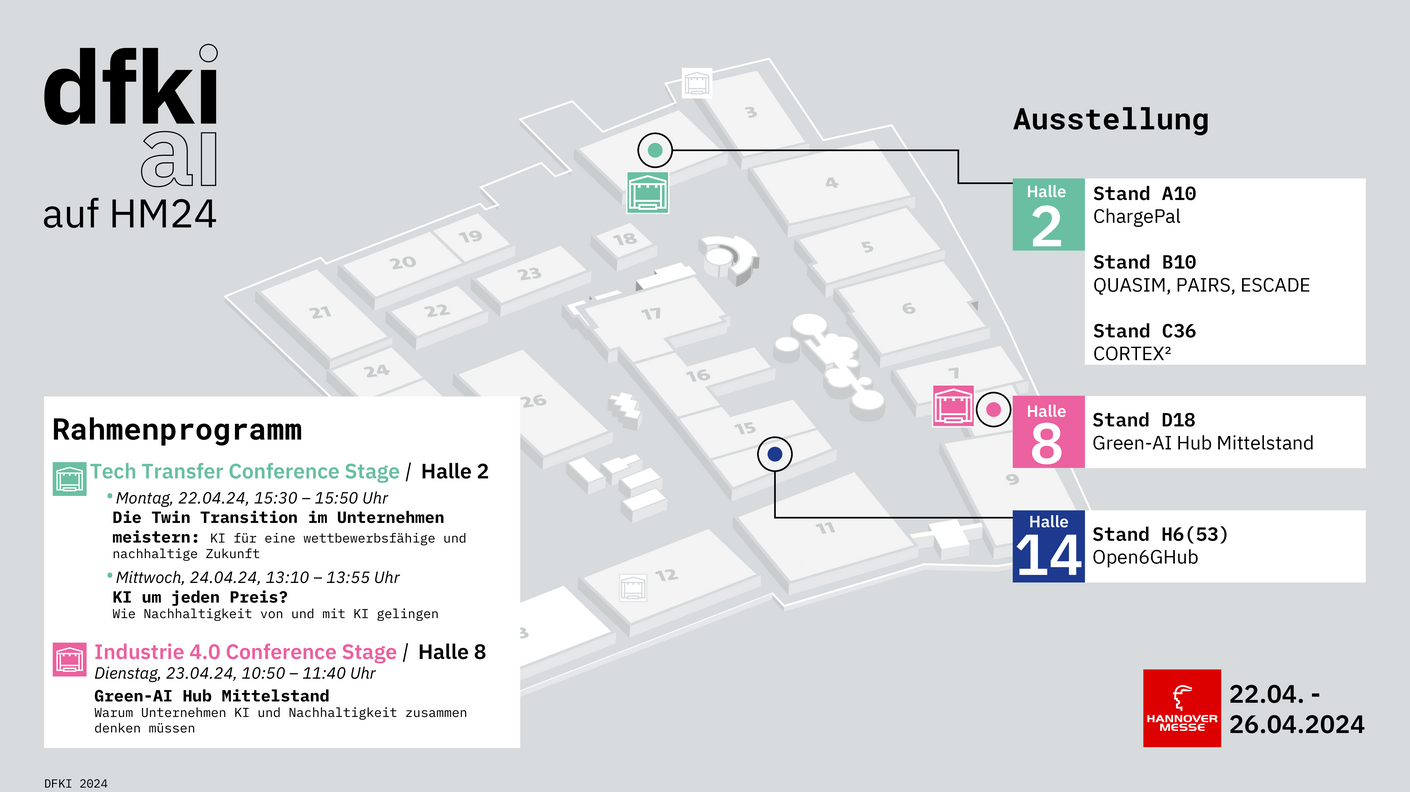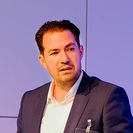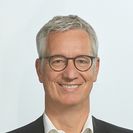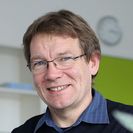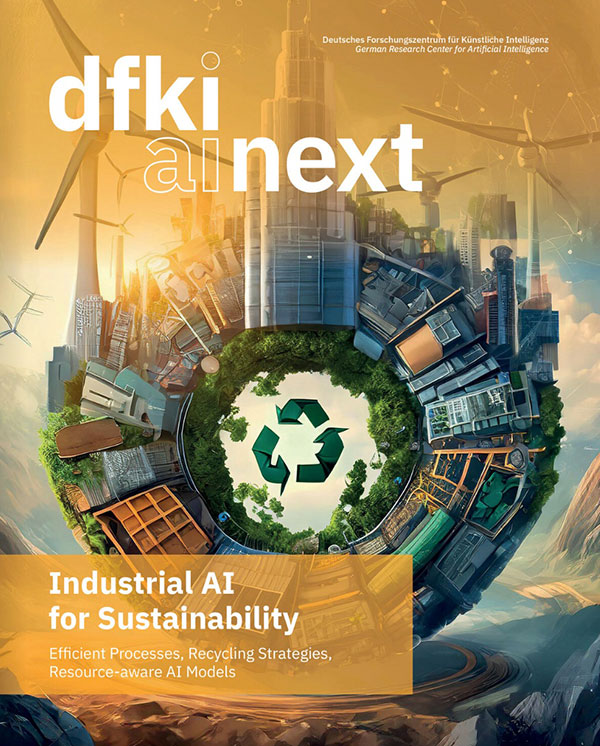
The German Research Center for Artificial Intelligence (DFKI) will be presenting AI solutions for a sustainable economy at several booths at the Hannover Messe from April 22 to 26, 2024. AI experts from the DFKI will participate in the supporting program with panels and presentations.
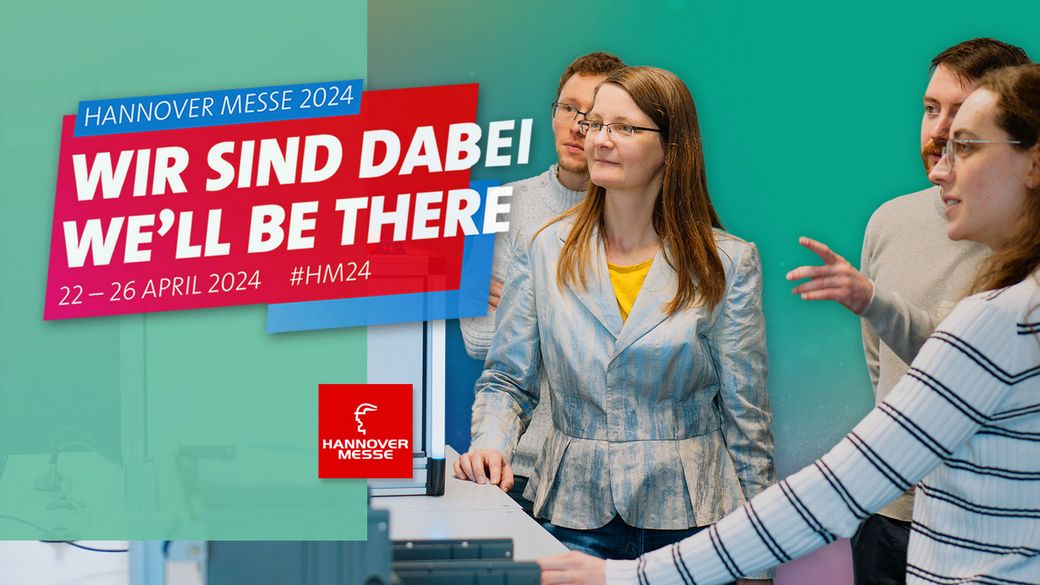
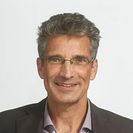
"Green AI is the top topic for Germany's industry. In the future, it is essential that companies also consider the environmental impact of artificial intelligence and its opportunities for sustainability. That is why we are showing in our contributions at the Hannover Messe how artificial intelligence creates concrete economic and ecological added value. Although AI can have very high energy requirements due to training and application, at the same time it can ensure that energy and resources are saved. Novel architectures and AI computing paradigms also hold enormous potential. AI is more sustainable than its reputation."
DFKI is researching both aspects, their positive contribution to sustainability and the sustainability of artificial intelligence (AI) itself. DFKI will be represented at the trade fair with a selection of current projects. Topics addressed include resource efficiency in SMEs (Hall 8, Stand D18), the energy consumption of data centers (Hall 2, Stand B10), real-time remote troubleshooting in factories with AR and VR (Hall 2, Stand C36) and the flexible charging of electric vehicles with robots (Hall 2, Stand A10).
In addition, researchers and guests from the DFKI network will discuss the various facets of Green AI at the Tech Transfer Conference Stage in Hall 2, at the Industry 4.0 Conference Stage in Hall 8 and on the stage of the SmartFactory-KL joint stand.
Go to DFKI stage program
Other exhibits at the trade fair will deal with the prediction and management of crises and easier access to quantum machine learning in manufacturing. In Hall 14, researchers will use two specific examples to demonstrate their vision of a 6G-supported industry.
Enabling the circular economy and saving resources in SMEs
The centerpiece of DFKI's presence at the trade fair is the joint stand with SmartFactory-KL. There, DFKI will show a demonstrator that illustrates how used parts can be reused in production with the help of visual quality control by AI, in the sense of a circular economy. An e-transporter brings this to SMEs to introduce them to the topic of resource efficiency.
Real-time customer support in factories with interactive AR
In the future, technicians will no longer have to travel far to rectify faults on machines. In the CORTEX² project, they see themselves in the same situation as their customers and can interact with each other remotely. CORTEX² combines video telephony with AR and VR for the next generation of telecooperation that emphasizes interactivity and resource-efficient data transmission.
Energy-efficient data centers and AI applications
What must AI, i.e., software and the required hardware, look like to meet the demand for energy efficiency? The ESCADE project aims to answer this question. The potential of neuromorphic chips is of particular interest here. In a specific AI use case, the energy required for sorting steel scrap is being investigated.
Flexible charging of electric vehicles with robots
In an inventive concept for charging electric vehicles, a robot comes to the car rather than the car to the charging station. In ChargePal, mobile charging robots transport high-performance batteries to vehicles to plug them in and charge the car. The robot-assisted approach could make it easier to upgrade existing properties and public parking lots for e-mobility and expand the charging infrastructure.
Identifying crisis scenarios faster with artificial intelligence
In a globally networked and dynamic world, crises are inevitable and difficult to predict, but require rapid and effective management. With AI, large amounts of data can be collected, analyzed and interpreted in real time. PAIRS deals with AI-based crisis management and presents services for the domains of civil defense, production & supply chains and energy.
Low-threshold access to Quantum AI services in manufacturing
In manufacturing, simulations are already being used to avoid errors. However, these require extensive computing resources. QUASIM aims to use quantum computing and quantum machine learning to accelerate simulations and achieve higher resolutions in order to optimize machining processes and reduce rejects.
Vision of a 6G infrastructure for the industry of tomorrow
Most ideas of Industry 4.0 require a more powerful communication infrastructure than that which already exists today with 5G. In the Open6GHub project, DFKI researchers are investigating numerous components that will be required to implement the new 6G standard.
Monday, 22.04.24, 15:30 – 15:50 | Tech Transfer Conference Stage, Hall 2
Managing the twin transition in your business: AI for a competitive and sustainable future
Keynote by Prof. Antonio Krüger (CEO DFKI)
Details
The digital transformation demands a lot from medium-sized companies. They need to be open to digital technologies, introduce them and use them. At the same time, companies are required to make their production more sustainable and efficient, conserve resources and save energy. They are therefore facing a double challenge, the twin transition, which is now in full swing.
As a business-oriented AI competence center for cutting-edge research, the German Research Center for Artificial Intelligence (DFKI) knows and addresses this issue. Digitalization and sustainability are strategically combined and driven forward here - with a view to the United Nations Sustainable Development Goals (SDGs). The aim is to develop and apply sustainability from and with AI solutions, where they generate socio-economic as well as ecological added value. DFKI stands for all "All of AI" and is aware of its ethical responsibility. The aim is to develop AI systems that are reliable, safe, robust, fair, and transparent for the benefit of people.
Livestream:
Tuesday, 23.04.24, 10:45 – 11:30 | Industrie 4.0 Conference Stage, Hall 8
Green-AI Hub Mittelstand - Why companies need to consider AI and sustainability together
Hosted by Simone Wiegand
Panel with Dr. Florian Kammerer (Leiter des Referats Nationale Kreislaufwirtschaftsstrategie, BMUV), Dr. Julia Fröhlich (Director Innovation Hub, HARTING Stiftung), Prof. Antonio Krüger (CEO, DFKI), Prof. Oliver Thomas (Leiter des DFKI-Forschungsbereichs Smart Enterprise Engineering, DFKI)
Details
Resource efficiency can pay off - for climate protection and resource conservation, but also for the competitiveness of companies. In March 2023, the Green-AI Hub Mittelstand was established. The Green-AI Hub Mittelstand is an AI initiative of the Federal Ministry for the Environment, coordinated by Zukunft-Umwelt-Gesellschaft gGmbH and implemented by DFKI. The Green-AI Hub Mittelstand helps companies use modern AI solutions for greater resource efficiency. By the end of 2025, DFKI will carry out up to 20 pilot applications with companies as part of the Green-AI Hub Mittelstand. On Tuesday at 10:50 on the Industrie 4.0 Conference Stage opposite the SmartFactory joint stand, representatives from science, politics and industry will talk about why AI and sustainability should and perhaps even must go hand in hand if companies want to succeed.
Livestream:
Wednesday, 24.04.24, 13:10 – 13:55 | Tech Transfer Conference Stage, Hall 2
AI at any price? How sustainability from and with AI can succeed
Hosted by Simone Wiegand
Panel with Prof. Wolfgang Maaß (Leiter des DFKI-Forschungsbereichs Smart Service Engineering), Prof. Christoph Lüth (Stellvertretender Leiter des DFKI-Forschungsbereichs Cyber-Physical Systems), Dr. Frederic Theodor Stahl (Leiter des DFKI-Forschungsbereichs Marine Perception)
Details
Every question you ask ChatGPT has its price. Every AI development and use leaves an ecological footprint. Can AI be sustainable at all? And if so, which indicators must be met? In a panel on Wednesday at 13:10 on the Tech Transfer Conference Stage, three experts from DFKI will discuss these and other questions relating to AI and sustainability from a scientific perspective.
Prof. Maaß, coordinator and head of ESCADE, a project at DFKI in which a team of numerous partners is researching energy-efficient data centers. Locating data centers in colder regions is the wrong approach, according to Maaß. ESCADE wants to get to the root of the problem and develop more energy-efficient algorithms and hardware.
With frugal AI, there is no need to connect to cloud data centers; it should LAO run directly on mobile devices and get by with little power, data and limited memory. Prof. Christoph Lüth reports from the FAIRe project on the components required for this approach.
Dr. Frederic Theodor Stahl, head of the Marine Perception research department and the DFKI competence center DFKI4planet, will discuss the entire life cycle of AI and shed light on the connection between production, use and possible measurability.
Livestream:
Monday, 22.04.24 | 17:30 - 18:00 | Livestream available
Frequency allocation options for nomadic 5G networks
Panel discussion with participation of Prof. Dr. Hans Schotten
Wednesday, 24.04.24 | 14:45 - 15:30 | Livestream available
The role of 6G in shaping the next industrial era
Panel discussion with participation of Prof. Dr. Hans Schotten
Monday, 22.04.24 | 10:00 - 11:00 | Livestream available
AI Horizons: Investing in the Future through Industrial AI and Sustainable Innovation
Panel discussion with participation of DFKI CEO Prof. Dr. Antonio Krüger
Press Contact
For interviews and discussions with our AI experts
Jennifer Oberhofer
Phone: +49 541 386050 7088
Jennifer.Oberhofer@dfki.de
Heike Leonhard
Phone: +49 681 85775 5390
Heike.Leonhard@dfki.de
DFKI Exhibits HM24
Enabling the circular economy and saving resources in SMEs
Hall 8, D18, Joint stand of SmartFactory-KL e.V.
Real-time customer support in factories with interactive AR
Hall 2, C36, Rhineland-Palatinate Innovation Agency
Energy-efficient data centers and AI applications
Hall 2, B10, Saarland joint stand
Flexible charging of electric vehicles with robots
Hall 2, A10, Niedersachsen joint stand Innovations from science and research
Identifying crisis scenarios faster with artificial intelligence
Hall 2, Stand B10, Saarland joint stand
Low-threshold access to Quantum AI services in production
Hall 2, Stand B10, Saarland joint stand
Vision of a 6G infrastructure for the industry of tomorrow
Hall 14, Stand H6 (53), Rhineland-Palatinate University of Technology Kaiserslautern-Landau
